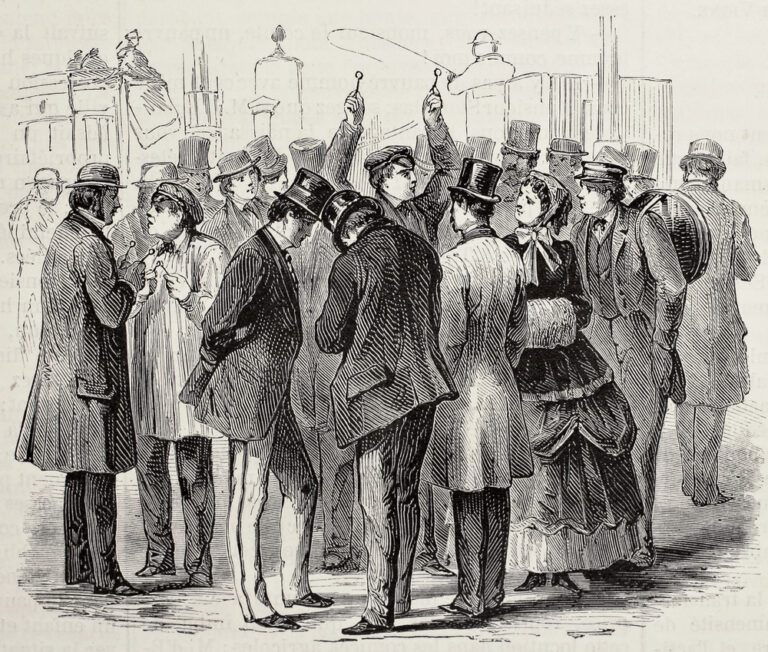The historian AJP Taylor wrote this the 1923 general election It was “the only election in British history which was solely and specifically about the question of protection”. The 1847 general election was one of the few elections to be contested.
The Reform Act of 1832 extended the franchise to elements of the growing urban middle class. The Conservative Party opposed the Act, but some realised that they now had to adapt to new political realities. Traditionally the party of the landed aristocracy, the Conservatives needed new allies. One of the most thoughtful Conservatives, Robert Peel, believed they could find them among the growing urban working class, who were often at odds with the Whig middle class. For the 1835 election, Peel issued his Tamworth Manifesto, which reconciled himself with the Reform Act and became the credo of the new Conservative Party. One-nation Toryism was born.
Aristocrats and workers soon united to oppose the Poor Law Reform Act of 1834, a key Whig measure aimed at reducing welfare spending. Bitterly resented by workers, it was also opposed by Tories. Richard Oastler, a radical Tory and reformer of factory legislation, called it “damnable, hellish, detestable, despotic, unchristian, unconstitutional and unnatural.”
Peel’s Conservatives were elected with a landslide majority in 1841, but tensions developed between Peel’s Conservatives, supporters of the “One Nation” movement, and the Tory aristocrats. The former, inspired by Richard Cobden’s Anti-Corn Law Leaguewanted to abolish the Corn Laws, the tariffs that excluded foreign wheat from Britain, raising food prices and hurting the working class, and to compensate for the loss of income with a new income tax. Justified on the grounds of “food security”, these laws financially benefited conservative landowners. These protectionists – denounced by Queen Victoria as “abominable, short-sighted and unpatriotic” and led by Benjamin Disraeli – resisted Peel to the bitter end – and beyond.
The Corn Laws were abolished on 25 June 1846. The protectionists retaliated that night, splitting and joining forces with the Whigs and the Irish Repeal Party. Peel resigned and was never elected again. Cobden paid tribute to him:
If he has lost his office, he has gained a country. For my part, I would rather descend into private life with this last measure… than rise to the highest pinnacle of human power by any other means.
Peel’s supporters – the ‘Peelites’ – supported the Whig government of Lord John Russell, but this unstable situation collapsed in July 1847 and an election was called.
“The election of 1847 took place…in an atmosphere of confusion, disorder and recrimination,” the historian wrote Robert Blake. Not only were the Whigs opposed to the Tories, but the Tories were opposed to each other, and the Irish Repeal Party was opposed to all. Tempers flared. In Marlow it was reported that a “gang of bloodthirsty ruffians” had “assaulted every respectable person who was not sympathetic to the (protectionist) cause”. In Berkshire, The temperature He wrote: “A pact now exists among the influential section of the constituency to retain the recently sitting member, ostensibly for the purpose of not disturbing the peace of the county.” Only 44% of the seats were contested.
The results were of little consequence. The Whigs gained slightly but did not gain a majority, the Peelites gained but the Protectionists lost about 50 seats. One defeated Protectionist candidate chided his audience in Essex, saying: “We have tried, without any difficulty, to penetrate some of your stupid brains, lest you go home as ignorant as you came!”
In opposition, protectionists led by Lord Stanley (soon to become Earl of Derby) and Disraeli came to terms with free trade, just as Peel had reconciled the Conservatives with the Reform Act. When Britain went to the polls again in 1852, Disraeli argued that “the spirit of the age tends towards free trade, and no statesman can with impunity ignore the genius of the age in which he lives.” After being narrowly returned to power, Derby announced that the Conservatives would “bow to the decision of the country” and pursue free trade “as if we had ourselves been the authors of that policy.” As the historian Thomas Babington Macaulay observed, Toryism amounted to little more than a defence of the Whig achievements of a previous generation.
The struggle to repeal the Corn Law cast a long shadow over British politics. Peel’s supporters, led by Peel’s protégé William Ewart Gladstone, joined the Whigs in 1859 to form the Liberal Party. The rivalry between Disraeli and Gladstone dominated British politics until the latter’s death in 1881, by which time Queen Victoria had come to love Disraeli and hate Gladstone. But all sides remained faithful to the faith of free trade as Britain reached its imperial peak. It was only when the country felt its relative position weakening that the old cause of protectionism revived.
John Phelan is an economist at Center for the American Experience.


